
Patrick Henry was an American politician, planter and orator who declared to the Second Virginia Convention (1775): "Give me liberty, or give me death!" A Founding Father, he served as the first and sixth post-colonial Governor of Virginia, from 1776 to 1779 and from 1784 to 1786.

The Colony of Virginia was an English, later British, colonial settlement in North America that existed between 1606 and 1776.
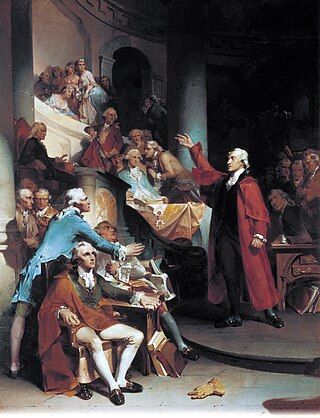
The House of Burgesses was the elected representative element of the Virginia General Assembly, the legislative body of the Colony of Virginia.

George Wythe was an American academic, scholar and judge who was one of the Founding Fathers of the United States. The first of the seven signatories of the United States Declaration of Independence from Virginia, Wythe served as one of Virginia's representatives to the Continental Congress and the Philadelphia Convention and served on a committee that established the convention's rules and procedures. He left the convention before signing the United States Constitution to tend to his dying wife. He was elected to the Virginia Ratifying Convention and helped ensure that his home state ratified the Constitution. Wythe taught and was a mentor to Thomas Jefferson, John Marshall, Henry Clay and other men who became American leaders.

Richard Bland, sometimes referred to as Richard Bland II or Richard Bland of Jordan's Point, was an American Founding Father, planter, lawyer and politician from Virginia. A cousin and early mentor of Thomas Jefferson, Bland served 34 years in the Virginia General Assembly, and with John Robinson and this man's cousin Peyton Randolph as one of the most influential and productive burgesses during the last quarter century of the colonial period.
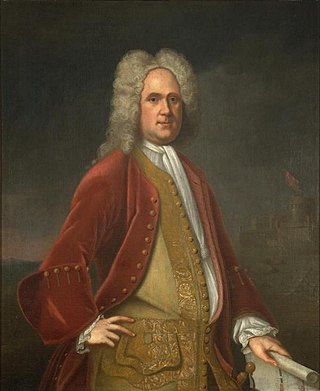
Alexander Spotswood was a British Army officer, explorer and lieutenant governor of Colonial Virginia; he is regarded as one of the most significant historical figures in British North American colonial history.

The "Parson's Cause" was a legal and political dispute in the British colony of Virginia often viewed as an important event leading up to the American Revolution. Colonel John Henry, father of Patrick Henry, was the judge who presided over the court case and jury that decided the issue. The relatively unknown Patrick Henry advocated in favor of colonial rights in the case.

The Virginia Resolves were a series of resolutions passed on May 29, 1765, by the Virginia House of Burgesses in response to the Stamp Act of 1765, which had imposed a tax on the British colonies in North America requiring that material be printed on paper made in London which carried an embossed revenue stamp. The act had been passed by the Parliament of Great Britain to help pay off some of its debt from its various wars, including the French and Indian War fought in part to protect the American colonies.
Edward Digges was an English barrister and colonist who became a premium tobacco planter and official in the Virginia colony. The son of the English politician Dudley Digges represented the colony before the Virginia Company of London and the royal government, as well as served for two decades on the colony's Council of State. Digges served as interim Colonial Governor of Virginia from March 1655 to December 1656, and for longer periods as the colony's receiver general and auditor-general. He is also known for planting mulberry trees and promoting the silk industry in the colony.
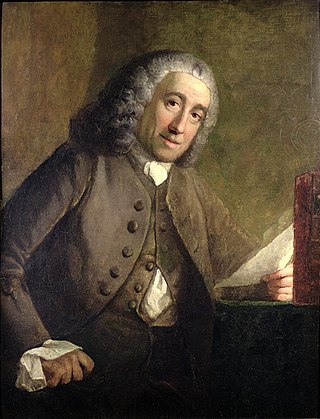
Francis Fauquier was a British colonial administrator who served as the lieutenant governor of Virginia from 1758 to 1768. Born in England to a Huguenot family, he emigrated to the British colony of Virginia to take up of the office of lieutenant governor. A teacher and close friend of Thomas Jefferson, Fauquier frequently hosted lavish parties for the American gentry as governor.
James Maury (1718–1769) was a prominent Virginia educator and Anglican cleric during the American Colonial period and the progenitor of the prominent Maury political family. The Reverend James Maury was a figure in the notable lawsuit that became known as "The Parson's Cause" in 1763, in which the young attorney Patrick Henry argued that the colony had the right to establish its own method of payment to clergy.
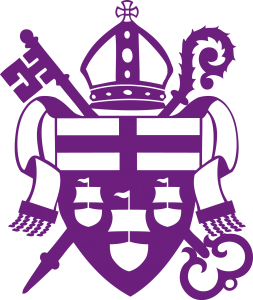
The Diocese of Virginia is the largest diocese of the Episcopal Church in the United States of America, encompassing 38 counties in the northern and central parts of the state of Virginia. The diocese was organized in 1785 and is one of the Episcopal Church's nine original dioceses, with origins in colonial Virginia. As of 2018, the diocese has 16 regions with 68,902 members and 180 congregations.
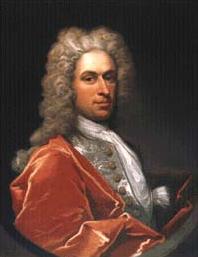
Colonel Thomas Lee was a planter and politician in colonial Virginia, and a member of the Lee family, a political dynasty. Lee became involved in politics in 1710, serving in both houses of the Virginia General Assembly, and also held important positions as Naval Officer for the Northern Potomac Region and agent for the Northern Neck Proprietary. After his father died, Lee inherited thousands of acres of land as well as enslaved people in then-vast Northumberland and Stafford Counties in Virginia as well as across the Potomac River in Charles County, Maryland. These properties were developed as tobacco plantations. Northumberland County was later subdivided, so some of Lee's properties were in modern Fairfax, Fauquier, Prince William and Loudoun Counties as well as the counties in the modern Northern Neck of Virginia.

William Fairfax (1691–1757) was a political appointee of the British Crown in several colonies as well as a planter and politician in the Colony of Virginia. Fairfax served as Collector of Customs in Barbados, Chief Justice and governor of the Bahamas; and Customs agent in Marblehead, Massachusetts, before being reassigned to the Virginia colony. In the Virginia Colony, Fairfax acted as a land agent for his cousin's vast holdings in the colony's northeast corner, known as the Northern Neck Proprietary. Also a tobacco planter himself, Fairfax was elected to the House of Burgesses representing King William County within the proprietary, which he helped split so that Fairfax County was created. Appointed to the Governor's Council, he rose to become its president. Fairfax also commissioned the construction of his plantation called Belvoir in what became Fairfax County to honor his family.

Colonel Nicholas Spencer, Jr. (1633–1689) was a merchant, planter and politician in colonial Virginia. Born in Cople, Bedfordshire, Spencer migrated to the Westmoreland County, Virginia, where he became a planter and which he twice briefly represented in the Virginia House of Burgesses. Spencer later served as the colony's Secretary and on teh Governor's Council, rising to become it President and on the departure of his cousin Thomas Colepeper, 2nd Baron Colepeper in 1683, was named Acting Governor (1683–84), in which capacity Spencer served until the arrival of Governor Lord Howard of Effingham. Spencer's role as agent for the Culpepers helped him and his cousin Lt. Col. John Washington, ancestor of George Washington, secure the patent for their joint land grant of the Mount Vernon estate.
John Camm (1718–1778) was an Anglican priest who served as the seventh president of the College of William and Mary. He was a fierce Tory advocate of the prerogative of the Crown and the established Church.

The history of Virginia in the American Revolution begins with the role the Colony of Virginia played in early dissent against the British government and culminates with the defeat of General Cornwallis by the allied forces at the Siege of Yorktown in 1781, an event signaled the effective military end to the conflict. Numerous Virginians played key roles in the Revolution, including George Washington, Patrick Henry, and Thomas Jefferson.

The history of religion in early Virginia begins with the founding of the Virginia Colony, in particular the commencing of Anglican services at Jamestown in 1607. In 1619, the Church of England was made the established church throughout the Colony of Virginia, becoming a dominant religious, cultural, and political force. Throughout the 18th century its power was increasingly challenged by Protestant dissenters and religious movements. Following the American Revolution and political independence from Britain, in 1786 the Virginia Statute for Religious Freedom disestablished the Church of England, ending public support and fully legalizing the public and private practice of other religious traditions.
John Blair was a merchant and politician of the colony of Virginia. He served in both houses of the Virginia General Assembly. As a member of the House of Burgesses, he initially represented Jamestown then Williamsburg, before being appointed to the Governor's Council. There he served for more than 25 years, including four times becoming acting governor during changes of the royal governors and while governor Francis Fauquier was in the New York and Georgia colonies. Nonetheless, this John Blair, the earliest of the four men of the name serving in the Virginia General Assembly, may be best known either as the nephew and heir of Rev. James Blair or father of John Blair, Jr..
Edward Digges was a Virginia merchant, planter and politician who represented York County in the House of Burgesses.












